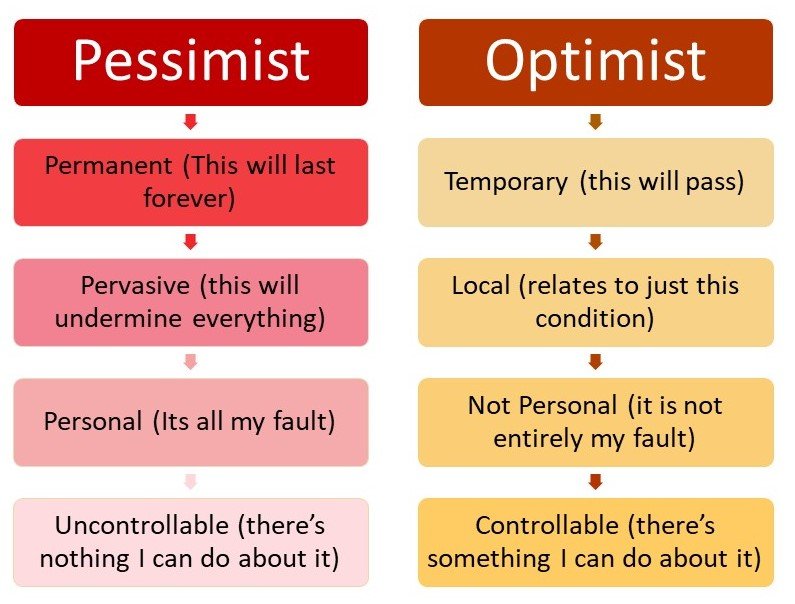Optimisms: Why Moderation is Necessary
To a lay man, optimism is a mental attitude characterized by hope and confidence in success and a positive future. Therefore, optimists expect good things to happen. Optimistic attitudes are linked to a number of benefits including better coping skills, lower stress levels, better physical health, and higher persistence when pursuing goals.
What is optimism?
There are two main approaches to defining optimism:
The Dispositional Optimism Theory
This theory suggests that optimism is a personality trait. Optimistic people generally expect good things to happen in the future, rather than bad things.
The Optimistic Explanatory Style
According to this model, optimists explain negative events by attributing them to external factors. On the other hand, pessimists attribute the causes of their negative experiences to internal factors.

Say you just attended a job interview where you did poorly. If you are an optimist, you might explain this by saying: “The interviewers were too harsh and inconsiderate; so, it was hard to focus.” This cause is external to you and suggests that you will score better in the next one when the interviewers are more lenient. A pessimist might have a different opinion: “I’m no good at interviews; I’m just stupid.” This explanation is instead internal and extends across a variety of situations. It implies that the person expects to score low in the future.
Surely, being so pessimistic and hard on yourself can’t be good. But is blaming your poor performance on harsh and inconsiderate interviewers a useful response?
How much optimism is too much optimism?
Optimism is generally taken as a positive trait. We tend to think of optimism as a good thing. Hence, keeping a positive mindset is often encouraged and seen as a way of leading a happy life. Optimism can, however, foster careless decisions, like entering a partnership or going for an interview full of confidence even though you didn’t prepare for it.
Is optimism a useful tool for us? Is it worth to harbour ‘good vibes’ when there’s a risk of making bad choices? The answer depends on the context and the kind of optimism we’re talking about.
Is being positive positively toxic?
We tend to overestimate the chances of good things happening to us, while underestimating the chance of bad things. For example, graduating students tend to overestimate how quickly they will get that dream job in NNPC (Great organization with great pay). We tend to maintain these biases even when we have contradictory information (High rate of unemployment and the dearth of workplace skills).
Another important example is the warning on cigarettes’ packs (The Federal Ministry of Health warns That smokers are liable to die young); however, informing people about the risks of drinking and smoking has shown to be ineffective in changing people’s views on associated diseases.
This clearly isn’t good. Unrealistic optimism can lead people to believe that negative consequences are unlikely while positive ones are to be expected. This may encourage them to take more risks. In the current pandemic, unrealistic optimism in our risk of infection may lead us to make poor health behaviours. In fact, it may thrive in uncertainty and ambiguity. Having no prior experience with a pandemic may lead people to underestimate the likelihood of being infected.
Palliative positivity
Optimisms is a predictor of resilience. In other words, optimists tend to bounce back more easily after experiencing negative events. Secondly, optimists have shown to be able to delay gratification, possibly because they have faith in long-term rewards. Optimism is not only linked with better mental health, but also with physical health. Positive people live longer and healthier. This happens because believing in positive outcomes reduces stress and anxiety, both of which relate to our immune system and mental health.
The way Forward
In conclusion, there are certain levels of optimism and pessimism that is healthy. In determining how hopeful you should be in life, in business and in the workplace, it is pertinent you apply moderation.
Moderation is the silken string running through the pearl-chain of all virtues.
~ Thomas Fuller
For this and much more Information relating to employability skills, employment opportunities, career advancement and entrepreneurship development; Join our Telegram and WhatsApp groups, and also follow us on Twitter and Facebook.





November 6, 2020 @ 4:07 am
Too much of everything is said to be bad. So for that,it ain’t bad to be an Optimists or pessimists . But don’t so much work with just one, leverage the both when needed.
November 6, 2020 @ 4:17 am
Thank you for this educative post.
One shouldn’t be too optimistic neither should one be too pessimistic. It is important to always strike a balance.
December 3, 2020 @ 1:56 am
I need to to thank you for this fantastic read!! I absolutely enjoyed every little bit of it.
I have got you saved as a favorite to look at new stuff you post…